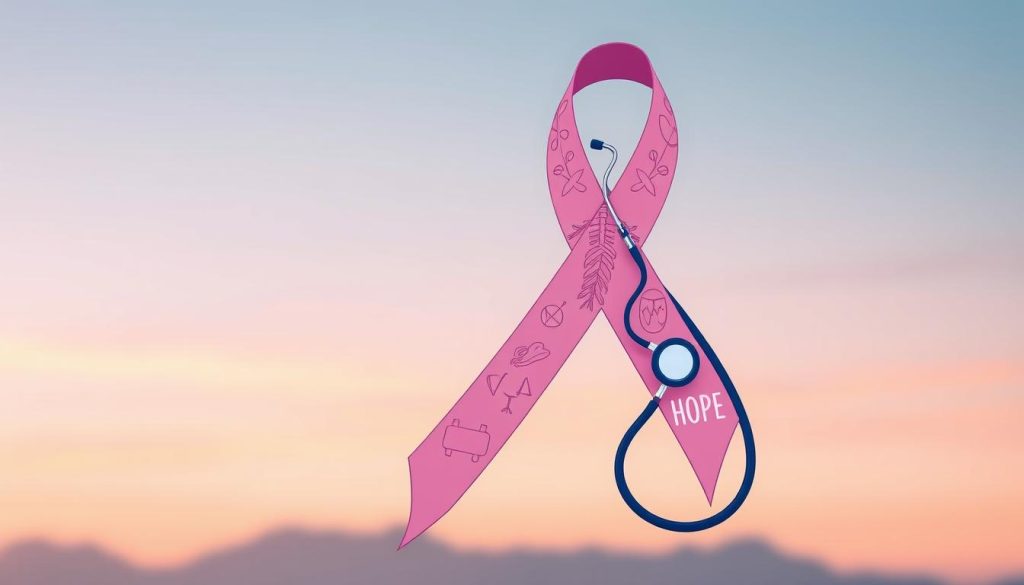Anal cancer is a rare but serious condition that affects thousands of people each year. This guide sheds light on the key aspects of this disease. It covers early warning signs and cutting-edge treatments. By understanding anal cancer symptoms and available treatment options, you can take proactive steps towards better health.
Early detection plays a critical role in fighting anal cancer. Recognizing symptoms and seeking prompt medical attention can significantly improve outcomes. This article aims to empower you with knowledge about risk factors, diagnostic procedures, and the latest advancements in anal cancer treatment.
As we explore this topic, you’ll gain insights into the various stages of anal cancer. You’ll learn about the different care approaches available. Whether you’re concerned about your own health or supporting a loved one, this guide offers valuable information to navigate the challenges of anal cancer.
Understanding Anal Cancer: An Overview
Anal cancer is a rare type of cancer that happens in the anus. It’s the end of the rectum. This cancer needs special care because of its unique treatment needs.
Definition and Basic Anatomy
The anus controls bowel movements and is part of the lower digestive system. It has the anal canal and the anal verge. These areas have cells that can turn cancerous.
Types of Anal Cancer
Anal cancer can take different forms, each affecting different cells. The most common types are:
- Squamous cell carcinoma
- Adenocarcinoma
- Basal cell carcinoma
- Melanoma
Prevalence and Statistics
Anal cancer is not as common as other colorectal cancers but is rising. Knowing this helps us see why early detection and treatment are key.
| Statistic | Value |
|---|---|
| Estimated new cases in 2021 | 9,090 |
| Percentage of all cancers | 0.5% |
| 5-year survival rate | 68.7% |
| Median age at diagnosis | 62 years |
These numbers show we need more awareness and research in anal cancer. Early detection and the right treatment can greatly improve survival rates.
Early Warning Signs of Anal Cancer
It’s key to spot the early signs of anal cancer to get timely treatment. Many ignore small symptoms, which can delay screenings. Knowing these signs can greatly improve treatment chances.
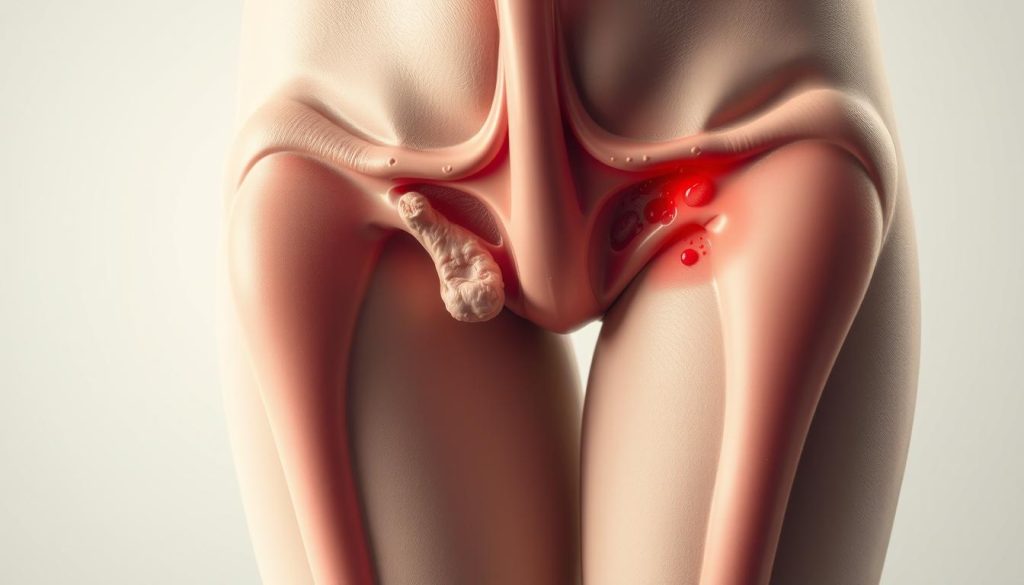
- Rectal bleeding or blood in stool
- Itching or pain around the anus
- Changes in bowel habits
- Unusual discharge from the anus
- Lumps or growths near the anal area
These symptoms can also mean other, less serious issues. A detailed screening is needed for a correct diagnosis.
| Symptom | Frequency | Action |
|---|---|---|
| Rectal bleeding | Common | Consult doctor immediately |
| Anal itching | Very common | Monitor, seek help if persistent |
| Bowel changes | Less common | Discuss with healthcare provider |
| Unusual discharge | Uncommon | Prompt medical evaluation |
| Anal lumps | Rare | Immediate medical attention |
If you notice any of these signs, see your doctor right away. Early cancer screening can lead to better treatment and outcomes for anal cancer.
Common Symptoms and When to Seek Medical Help
Spotting cancer symptoms early is key to successful treatment. Some signs of rectal cancer might look like other health issues. But, it’s vital to watch for symptoms that don’t go away or get worse.
Physical Symptoms
Anal cancer often shows up as bleeding from the anus, lumps near the anus, or changes in bowel habits. If you see any odd changes, like these, around your anus, see a doctor.
Digestive Changes
Digestive problems can signal rectal cancer early. Look out for:
- Constipation or diarrhea that lasts more than a few weeks
- Narrow stools
- Feeling that your bowel doesn’t empty completely
- Unexplained weight loss
If these symptoms stick around, get medical advice right away.
Pain and Discomfort Patterns
Pain from anal cancer can be different. You might feel:
| Pain Type | Description | When to Seek Help |
|---|---|---|
| Anal Pain | Discomfort or pain in the anal area | Persistent for more than a week |
| Rectal Pain | Pain during bowel movements | Ongoing for several days |
| Pelvic Pain | Discomfort in the lower abdomen | Lasting more than a few days |
Early cancer detection can improve treatment results. If you notice these symptoms, and they don’t go away or get worse, talk to your doctor fast.
Risk Factors for Developing Anal Cancer
It’s important to know about cancer risk factors to prevent it. Anal cancer is rare but has known risk factors. These can increase your chance of getting the disease.
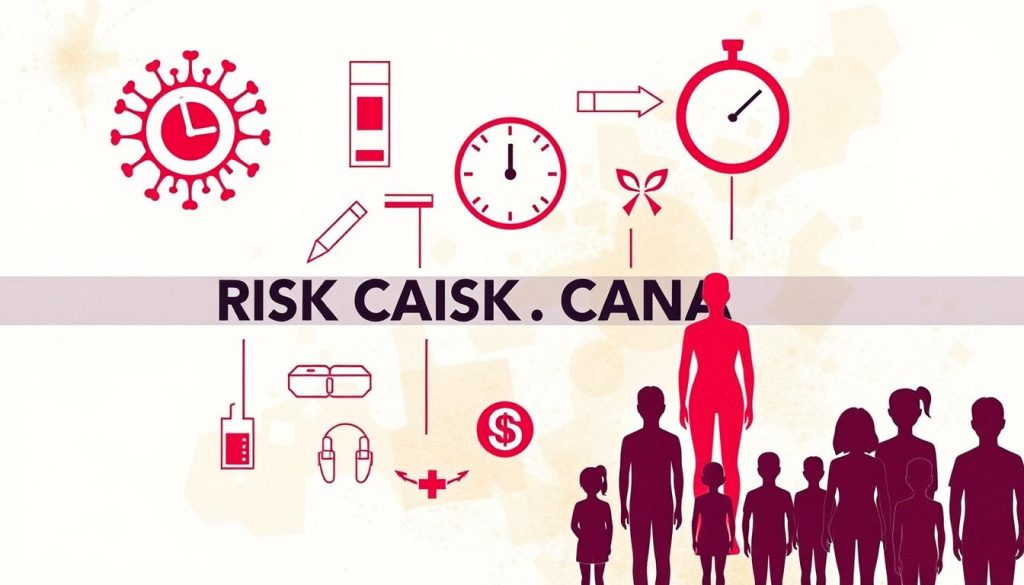
HPV Infection
HPV infection is the biggest risk for anal cancer. This virus is found in almost all anal cancer cases. Getting the HPV vaccine is a big step in preventing cancer.
Lifestyle Factors
Some lifestyle choices can raise your risk of anal cancer:
- Smoking tobacco
- Having many sexual partners
- Practicing anal sex
- Eating a diet low in fruits and veggies
Medical History Considerations
Your medical history affects your risk of anal cancer. These include:
- A weakened immune system from HIV/AIDS or organ transplant
- Having had cervical, vulvar, or vaginal cancer before
- Chronic inflammation from conditions like hemorrhoids or fistulas
Knowing these risk factors helps you prevent cancer. Regular check-ups and changing your lifestyle can lower your risk of anal cancer.
Diagnostic Procedures and Tests
Finding anal cancer early is key to treating it well. Doctors use different ways to check for this cancer. Let’s look at the main steps to find anal cancer.
The first thing doctors do is a physical check. They look for any odd lumps or growths in the anal area. They might also do a digital rectal exam to feel for anything unusual inside.
If something seems off, doctors might suggest more tests:
- Anoscopy: A small, lighted tube is used to examine the anal canal and rectum
- Biopsy: A small tissue sample is taken for laboratory analysis
- Imaging tests: CT scans, MRIs, or PET scans help visualize the affected area
For a detailed look at these tests, see the table below:
| Procedure | Purpose | What to Expect |
|---|---|---|
| Physical Exam | Initial screening | Visual and tactile inspection of anal area |
| Anoscopy | Detailed visual examination | Insertion of a small, lighted tube |
| Biopsy | Tissue analysis | Removal of a small tissue sample |
| Imaging Tests | Visualize affected area | Non-invasive scans of the body |
Your doctor will pick the right tests based on your symptoms and risk. Early detection through these methods can greatly help in treating anal cancer.
Stages of Anal Cancer Development
Knowing the stages of anal cancer is key for good treatment and care. Doctors use a system to see how far the cancer has spread. This helps them plan the best treatment.
Stage Classification System
The American Joint Committee on Cancer (AJCC) TNM system is used for staging anal cancer. It looks at three main things:
- T: Size and extent of the primary tumor
- N: Spread to nearby lymph nodes
- M: Presence of distant metastasis
Tumor Size and Spread
The T stage shows the tumor’s size and how far it has spread. A bigger tumor or deeper invasion means a higher T stage. This shows the cancer is more advanced.
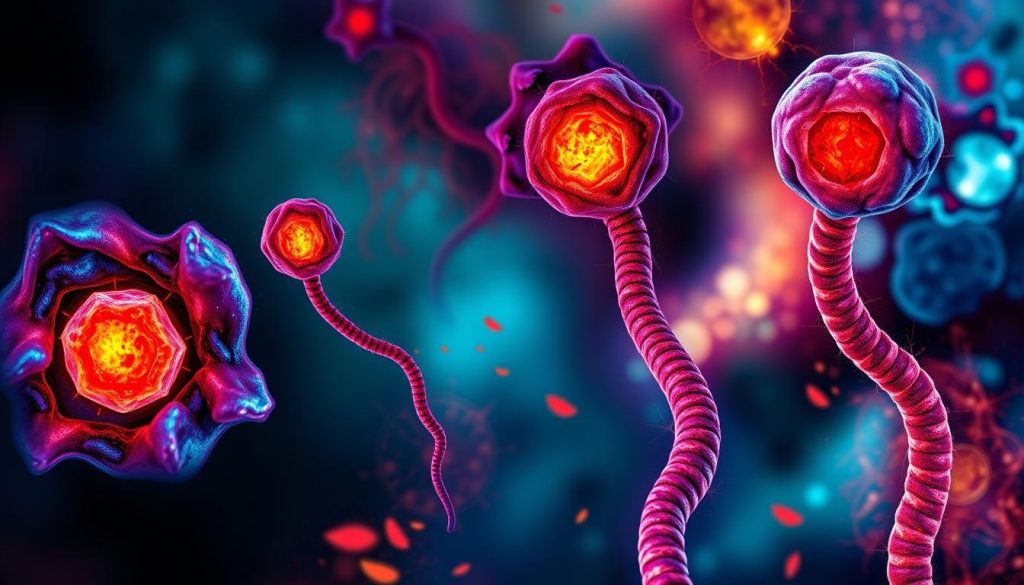
Lymph Node Involvement
Lymph node involvement is very important in anal cancer staging. The N stage shows if cancer cells have reached nearby lymph nodes. It also shows how many are affected.
| Stage | Description | Treatment Approach |
|---|---|---|
| Stage I | Small tumor, no lymph node involvement | Chemoradiation |
| Stage II | Larger tumor, no lymph node involvement | Chemoradiation, possible surgery |
| Stage III | Any tumor size with lymph node involvement | Intensive chemoradiation |
| Stage IV | Distant metastasis | Systemic therapy, palliative care |
Accurate staging helps doctors create treatment plans that work well. They consider how to keep the patient’s quality of life good too.
Treatment Options for Anal Cancer
Anal cancer treatment has many approaches, each tailored to the patient. Oncology specialists create personalized plans. These plans may include one or more treatment methods.
Radiation Therapy
Radiation therapy uses high-energy beams to target cancer cells. It’s often the first choice for anal cancer treatment. Patients get daily sessions for several weeks.
Side effects can include skin irritation and fatigue.
Chemotherapy Protocols
Chemotherapy drugs kill cancer cells throughout the body. For anal cancer, it’s usually given with radiation. Drugs like 5-fluorouracil and mitomycin are common.
Surgical Interventions
Surgery is sometimes needed for anal cancer treatment. Options include local excision for small tumors or abdominoperineal resection for advanced cases. Recovery time varies based on the procedure’s extent.
| Treatment | Primary Use | Duration | Common Side Effects |
|---|---|---|---|
| Radiation Therapy | Early-stage cancer | 5-6 weeks | Skin irritation, fatigue |
| Chemotherapy | With radiation or advanced cases | Varies | Nausea, hair loss |
| Surgery | Small tumors or advanced cases | Single procedure | Pain, infection risk |
Your oncology team will discuss the best cancer treatment plan for your specific case. They’ll consider factors like cancer stage, overall health, and side effects. This helps determine the most effective approach.
Latest Medical Advancements in Anal Cancer Treatment
The field of oncology is rapidly evolving, bringing new hope for anal cancer patients. Recent breakthroughs in cancer treatment are changing the landscape of care and improving outcomes.
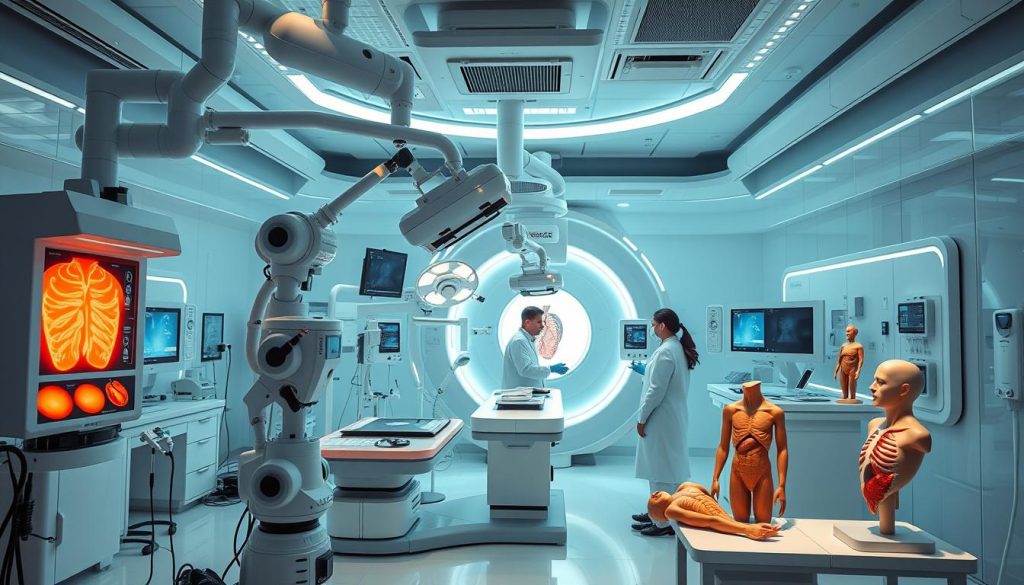
Targeted therapies are at the forefront of innovation. These treatments zero in on specific cancer cells, reducing damage to healthy tissue. Immunotherapy is another exciting approach. It boosts the body’s natural defenses to fight cancer more effectively.
Novel drug combinations are showing promise in clinical trials. By attacking cancer from multiple angles, these therapies aim to improve survival rates and quality of life for patients.
| Treatment Type | Description | Potential Benefits |
|---|---|---|
| Targeted Therapy | Focuses on specific molecules involved in cancer growth | Reduced side effects, increased effectiveness |
| Immunotherapy | Stimulates the immune system to fight cancer | Long-lasting remissions, fewer side effects |
| Combination Therapy | Uses multiple drugs or approaches together | Enhanced efficacy, lower risk of resistance |
Ongoing research is exploring personalized medicine approaches. By analyzing a patient’s genetic makeup, doctors can tailor treatments for better results. This individualized care holds great promise for the future of anal cancer treatment.
Recovery and Rehabilitation Process
The journey after anal cancer treatment is about careful recovery and rehabilitation. Patients face physical challenges and lifestyle changes. They rely on support systems for healing. Understanding this process helps set realistic expectations and achieve better outcomes.
Physical Recovery Timeline
Recovery from anal cancer treatment varies for each person. Most patients start feeling better within 4-6 weeks after therapy. Full recovery can take several months.
During this time, the body heals from cancer treatment effects. Fatigue, skin irritation, and digestive issues gradually improve.
| Time Period | Expected Progress |
|---|---|
| 1-2 weeks | Rest and manage side effects |
| 2-4 weeks | Gradual increase in activity |
| 1-3 months | Return to normal routines |
| 3-6 months | Full recovery for most patients |
Lifestyle Adjustments
Recovering from anal cancer often requires lifestyle changes. Patients may need to modify their diet to ease digestive symptoms. Gentle exercise helps regain strength and improves mood.
Quitting smoking and limiting alcohol intake support healing. They also reduce the risk of cancer recurrence.
Support Systems
A strong support network is key for recovery. Family, friends, and support groups offer emotional comfort and practical help. Healthcare teams provide ongoing care and address concerns.
Some patients find counseling helpful in coping with the psychological impact of cancer treatment. These support systems play a vital role in the healing process and future cancer prevention efforts.
Prevention Strategies and Screening Guidelines
Preventing anal cancer is key to staying healthy. It starts with knowing your risks and changing your lifestyle. The HPV vaccine is a big help in lowering your risk.
Getting screened regularly is also important. If you’re at high risk, talk to your doctor about tests. These might include digital rectal exams and anal Pap tests.

- Quit smoking
- Limit alcohol consumption
- Maintain a healthy weight
- Practice safe sex
Screening guidelines depend on your risk level. Here’s a quick guide:
| Risk Level | Recommended Screening | Frequency |
|---|---|---|
| Low Risk | Digital rectal exam | Annually after age 50 |
| High Risk | Digital rectal exam and anal Pap test | Every 1-3 years starting at age 25 |
| HIV-positive | Digital rectal exam and anal Pap test | Annually, regardless of age |
Early detection is key. It can make treatment much more effective. Discuss your screening plan with your doctor to find what’s best for you.
Living with Anal Cancer: Coping Strategies
Facing anal cancer brings unique challenges. To cope, we need to look at emotional, practical, and quality of life aspects. Let’s explore strategies to help navigate this journey.
Emotional Support
Dealing with anal cancer can be overwhelming. Seeking emotional support is key for mental well-being. Join support groups or talk to a therapist who knows oncology.
These resources offer comfort and understanding from others who’ve been through similar experiences.
Practical Daily Management
Managing daily life during cancer treatment needs adjustments. Create a routine that balances rest and activity. Use a planner or app to keep track of medications and appointments.
Don’t hesitate to ask for help with household tasks or transportation to medical visits.
Quality of Life Considerations
Maintaining quality of life is essential. Focus on activities that bring joy and relaxation. Try gentle exercises like yoga or walking to boost energy levels.
Nutrition is key in recovery, so get advice from a dietitian. Remember, self-care isn’t selfish – it’s vital for healing.
| Coping Strategy | Benefits | Implementation Tips |
|---|---|---|
| Support Groups | Emotional connection, shared experiences | Ask your oncologist for local group recommendations |
| Mindfulness Practices | Stress reduction, improved focus | Try guided meditation apps or local classes |
| Nutritional Planning | Better energy, support healing | Work with a dietitian to create a tailored meal plan |
Alternative and Complementary Therapies
In the world of cancer treatment, many people look into alternative and complementary therapies. These methods aim to help with overall health during treatment. Acupuncture, meditation, and herbal supplements are some of the most popular choices.
Some people find these therapies help with side effects. But, it’s important to be careful. Not all of these therapies are proven to work, and some might harm your cancer treatment. Always talk to your oncology team before trying any new therapies.
Many cancer centers have programs that mix standard treatments with safe, proven therapies. These might include yoga, massage, or nutrition advice. The goal is to make patients feel better while they’re going through tough treatments.
It’s important to remember that these therapies should not replace your doctor’s treatment plan. They are meant to add to it, not take its place. Talking openly with your healthcare team is the best way to make sure you get a treatment plan that works for you.
FAQ
Q: What are the early warning signs of anal cancer?
A: Signs of anal cancer include bleeding from the anus or rectum. You might also feel pain or pressure in the area. Itching, discharge, and changes in bowel habits are other symptoms.
It’s important to remember that these symptoms can have other causes. But if they keep happening, see a doctor.
Q: How is anal cancer diagnosed?
A: Doctors use a few ways to find anal cancer. They do a physical check, imaging tests like MRI or CT scans, and a biopsy. They might also do a digital rectal exam and anoscopy.
Early detection is key. So, regular check-ups are a good idea for those at high risk.
Q: What are the main risk factors for developing anal cancer?
A: HPV infection is the biggest risk factor for anal cancer. Having had cervical, vaginal, or vulvar cancer also increases risk. Smoking and a weakened immune system are other factors.
Age matters too. Most cases happen in people over 50.
Q: What treatment options are available for anal cancer?
A: Treatment often includes radiation therapy and chemotherapy together, called chemoradiation. Sometimes, surgery is needed. The treatment plan depends on the cancer’s stage and the patient’s health.
Q: Can anal cancer be prevented?
A: Not all cases can be prevented, but there are ways to lower the risk. Getting the HPV vaccine and practicing safe sex can help. Quitting smoking and keeping a healthy immune system are also important.
Regular screenings for those at high risk can catch problems early.
Q: What is the survival rate for anal cancer?
A: Survival rates for anal cancer depend on when it’s found. The American Cancer Society says the 5-year survival rate for early-stage anal cancer is about 82%.
For cancer that has spread, the survival rate drops to 66% for regional spread and 34% for distant spread. Finding it early makes a big difference.
Q: How does anal cancer differ from colorectal cancer?
A: Anal cancer and colorectal cancer are different diseases. Anal cancer is in the anus, while colorectal cancer is in the colon or rectum. They have different causes, symptoms, and treatments.
Q: What support resources are available for people with anal cancer?
A: There are many resources for people with anal cancer. Support groups, online forums, and patient advocacy organizations offer help. The Anal Cancer Foundation and the American Cancer Society provide information and support.
Many hospitals also have oncology social workers who can offer guidance and emotional support.
Q: Are there any new treatments being developed for anal cancer?
A: Yes, new treatments for anal cancer are being researched. Immunotherapy, targeted therapies, and new drug combinations are being explored. Clinical trials are testing these new approaches, which could offer more treatment options in the future.
Q: How often should high-risk individuals be screened for anal cancer?
A: Screening frequency for high-risk individuals varies. Usually, annual anal cytology and regular digital ano-rectal exams are recommended. This includes HIV-positive people and those with a history of HPV-related cancers.
It’s best to talk to a healthcare provider about the right screening schedule for you.












